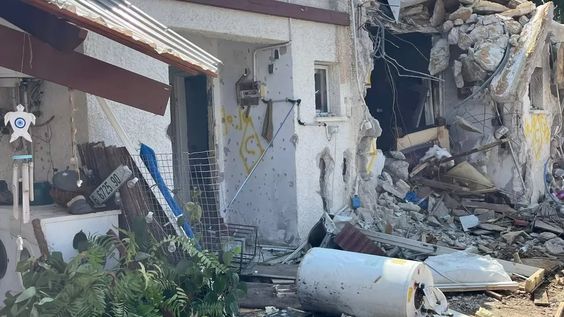Headlines
Hamas militants killed families in their homes near Kfar Aza

A microcosm of the early stages of this battle, Kibbutz Kfar Aza also offers a preview of potential future developments.
In the kibbutz, one of the Israeli settlements near the Gaza border, violence continued as of Tuesday morning. Because of this, the bodies of its Israeli citizens who died when Hamas breached the border fence from Gaza early on Saturday morning are only now being collected.
Soldiers who spent the most of the day searching through the rubble for human bodies claimed that there had been a slaughter. It appears likely that a significant portion of the murders took place during the initial assault on Saturday.
According to Davidi Ben Zion, the deputy commander of Unit 71, the skilled squad of paratroopers who led the assault, the Israeli army arrived at the kibbutz after being taken off guard and it took them 12 hours.
“Thank God we saved many lives of many parents and children,” he added. Sadly, some people were burned by Molotov cocktails. They exhibit extreme animal-like aggression.
In the words of Mr. Ben Zion, the Hamas militants who murdered families, including infants, were “just a jihad machine to kill everybody, [people] without weapons, without nothing, just normal citizens that want to take their breakfast and that’s all.”
He claimed that some of the victims had been beheaded.
“It’s horrible to behold, they cut off some of their heads and slaughtered them… therefore we must keep in mind who the enemy is as well as what our role is in the fight for justice, where there is a right side and we need the support of the entire globe.
A second policeman indicated a purple sleeping bag covered in blood. A bloated toe protruded. He claimed that the woman below had been murdered and beheaded in her front lawn. I didn’t request that the police lift the sleeping bag so I could look at her body. A dead Hamas gunman’s swollen, scorched body lay a few yards distant.
READ ALSO: UN to look into ‘war crimes’ committed by Israel and Hamas
Kibbutz Kfar Aza adds to the substantial body of evidence that Hamas fighters have committed war crimes. Like their Israeli neighbours, the neighbourhood was caught off guard.
The kibbutz guard, who patrolled the perimeter and were kibbutz inhabitants with military expertise, served as its first line of protection. They died in the battle against the assailants.
Their corpses were removed from their places in the kibbutz’s centre this morning, and like those of the other Israeli victims, they were wrapped in black plastic, transported on stretchers to a parking lot, and then lay in a line while being collected.
After Hamas took over control of Gaza in 2007, residents of Israeli border settlements prepared for recurring rocket attacks. They accepted the risk as the cost of living in the country in a close-knit community that still possessed remnants of the pioneer spirit of the earliest Zionist colonies.
Despite the threat of Hamas rockets, residents of Kfar Aza and the other Israeli communities near the Gaza Strip had a fair standard of living. A concrete shelter was never farther than a quick step away in the kibbutz’s residences, yards, and open spaces.
There were reinforced safe rooms in every home. Additionally, there were outdoor terraces, barbecues, kid-friendly swings, and plenty of fresh air.
However, nobody at Kfar Aza or anywhere else in Israel had any idea that Hamas would be able to get past Israel’s defences and kill such a large number of people.
Israelis are horrified and furious, but they are also stunned that the government and military failed in their core obligation to protect the people.
The bodies of the deceased Hamas militants who killed so many of them have been left to decay in the sun, lying exposed in the bushes, ditches, and open fields of the kibbutz where they were slaughtered.
The motorcycles they used to charge into the kibbutz after cutting over the border fence are found close to where they were killed. There is also the debris of a paraglider, which was used to soar past Israel’s defences; it was pushed off the route and onto a flower bed.
